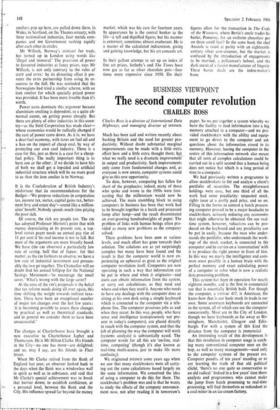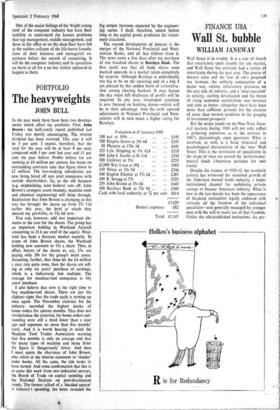The second computer revolution
BUSINESS VIEWPOINT CHARLES ROSS
Charles Ross is a director of International Data Highways, and managing director of ItTrmico.
Much has been said and written recently about backing Britain and the need for greater pro- ductivity. Without doubt substantial marginal improvements can be made with a little extra effort here and a little extra thought there; bjat. what we really need is a dramatic improvement' in output and productivity. Such improvements only come from fundamental changes and, as everyone is now aware, computer systems could give us this new opportunity.
To date, however, computing has fallen far short of the prophecies; indeed, many of those who spoke and wrote in the 1950s were fore- casting that the millennium would now be achieved. The main stumbling block to using computers in business has been that work had to be brought together in a batch and processed lump after lump—and the result disseminated on ever-growing hundredweights of paper. The problem of links with human beings often pro- vided as many new problems as the computer solved.
These problems have been seen at various levels, and much effort has gone towards their solution. The solutions are as yet surprisingly complex but many have been found and the result is that the computer world is now ex- periencing an upheaval as great as the original computer revolution itself. Computers are now operating in such a way that information can be put in where and when it originates—and users can obtain information from the system, or carry out calculations, as they need and where and when they need it. Anyone who needs to have any dealings with the computer does so sitting at his own desk using a simple keyboard which is connected to the computer via a tele- phone line. The computer processes jobs as and when they occur. In this way, people, who have sense and intelligence (conspicuously not pre- sent in today's computers), are placed directly in touch with the computer system, and thus the job of planning the way the computer will work (systems analysis) is substantially eased. The computer words for all this are 'on-line, real- time, computing' (though it's also known as real-time multi-access, just to make life more confusing).
We originated writqco some years ago when we saw that many stockbrokers were all carry- ing out the same calculations based largely on the same information. We conceived the idea of using a computer to do this for them. The stockbroker's problem was and is that he wants to study the effects of the company announce- ment now, not after reading it in tomorrow's paper. So we put together a system whereby we have the facility to feed information into a big memory attached to a computer—and we pro- vided stockbrokers with the ability and equip- ment to go direct to the computer and ask questions about the information stored in its memory. However, having the computer in the centre of this information network also meant that all sorts of complex calculations could be carried out in a split second that a human being does not notice but which is a long period of time to a computer.
We had previously written a programme to allow stockbrokers to list and analyse a client's portfolio of securities. The straightforward holdings were easy, but one third of all the work had some peculiarity: unquoted stock, rights issue at a partly paid price, and so on.
Filling in the forms to control a batch process- ing computer proved to be a major headache to stockbrokers, seriously reducing any economies that might otherwise be obtained. On our real- time system, however, valuations can be pro- duced on the keyboard and any peculiarity can be put in easily, because the man who :tinder- stands the portfolio, who understands the work- ings of the stock market, is connected to thb computer and he carries on a 'conversation' with it to produce the right answer in-front of him.
In this way we marry the intelligence and com- mon sense possible in a human brain with the perfect memory and exact calculating power of a computer to solve what is now a realistic data processing problem.
This system has been in operation for nearly eighteen months, and is the first in commercial use that is essentially British built. For though the computer, a UNIVAC 417, is American, the know-how that is our basic stock in trade is our own. Some seventeen keyboards are connected to the system, all of which can use the computer concurrently. Most are in the City of London, though we have keyboards as far away as Bir- mingham, Manchester, Glasgow and Edin- burgh. For with a system of this kind the distance from the computer is immaterial.
An interesting result of this development is that this revolution in computer usage is catch- ing many conventional computer men on the hop, as well as many managements—used only to the computer systems of the present era. Computer pundits of ten years' standing or so are learning the truth of that old political cliché, 'there's no one quite so conservative as an old radical.' Indeed in a few years' time those analysts and programmers who cannot make the jump from batch processing to real-time processing, will find themselves as redundant as a coal miner in an ice-cream factory. One of the major failings of the 'bright young men' of the computer industry has been their inability to understand the human problems that top management, middle management, and those in the office or on the shop floor have felt at the sudden collapse of the life-learnt founda- tions of their business and managerial ex- perience before the onrush of computing. It will do the computer industry and its specialists no harm at all for a no less violent upheaval to happen to them.



































 Previous page
Previous page